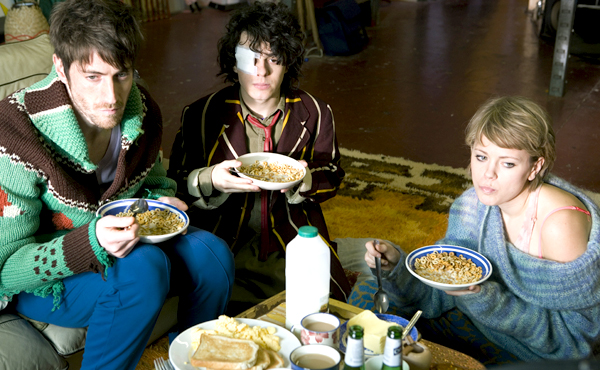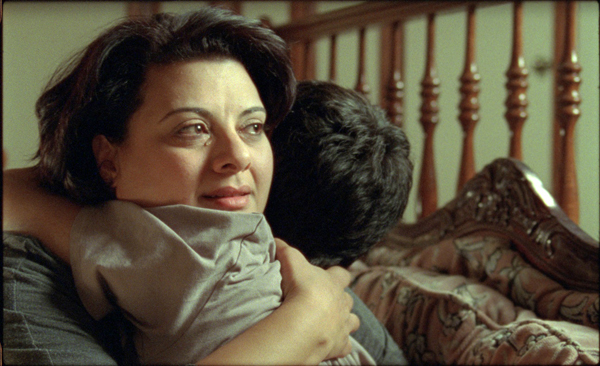|
Reviews of Recent Independent, Foreign, & Documentary Films in Theaters and DVD/Home Video

ROUNDUP OF NEW DIRECTORS/NEW FILMS 2009,
PART ONE The annual New Directors/New Films series tends to be dominated by young filmmakers, so their subjects often reflect themes of interest to their cohort. What’s surprising this year is their flair and creative approaches to the usual themes. Unmade Beds joins the familiar genre of twenty-somethings finding themselves and romance, like in Cédric Klapisch‘s L’Auberge Espagnole (which shares one of Bed’s attractive and lively cast members) and Joachim Trier‘s Reprise (which shares the same cinematographer, Jakob Ihre). But writer/director Alexis Dos Santos (Glue) exudes an exuberant energy as he brings together a cross-section of the European Union in a London squat where the occupants wake up sometimes with the same person and sometimes not, sometimes with the opposite sex and sometimes not, sometimes pretending to be someone else and sometimes not. A strong selling point is the terrific soundtrack of up-and-coming indie bands (including Kimya Dawson, prominently heard in Juno). More palpable than the sex here is the longing for connection, and Dos Santos keeps coming up with different visual styles and sounds to signal their feelings. Do I stay or do I go is a typical dilemma in young directors’ films. The spoiled “little emperors” of rural China in the three quiet, visually lyrical interconnected stories in Zhang Chi’s The Shaft have to make the usual decision whether to rebel against their parents’ wishes or accommodate to a life working at the local mine. The confusingly identical hunky French twins in Pascal-Alex Vincent’s Give Me Your Hand go on the usual but striking looking road trip of sexual discovery. With Ordinary Boys, Spanish director Daniel Hernández leaves documentary filmmaking to examine through fictionalization why so many young Moroccans were among the Madrid train attack’s bombers. He has sympathetic insight for his local cast, but he heavy-handedly hammers home economic motives, showing that in their dry, restricted village climate they are literally between a rock and a hard place.
The most touching films in the series are about going home, with pride even in defeat. The indigenous Guarani Indians of Brazil reenact their desperate reclamation of their traditional Amazon land in Marco Bechis’s sobering Birdwatchers (to be released by IFC Films). That the central couple in Barking Water is Native American, as well as the director, Sterlin Harjo, just adds a rich context to this involving drama. After Irene (Casey Camp-Horinek) springs terminally ill Frankie (Richard Ray Whitman) from the hospital, they race time so he can reconcile with her and with his adult children. In a beautiful road movie unusual for its delicacy, their long, complicated, grown-up relationship is revealed gradually, with minimal flashbacks, family visits, and small acts of kindness. At the other end of the age spectrum, two girls in Korea are abruptly forced on the road to a new home in So Yong Kim’s Treeless Mountain. The heart-grabbing six-year-old Jin and her younger sister Bin anxiously try to adapt to first being suddenly uprooted from their estranged parents’ city life, then to their drunken aunt’s small town, and finally to their mother’s ancestral farm. Their story is always seen from their point of view and unfolds through a visual accrual of small incidents and promises that constitute a child’s whole world. Try not to tear up as their eyes widen at seeing how the dumplings they’ve been coveting are laboriously made from scratch by their grandmother. Oscilloscope Pictures will release the film next month. In Vladimir Kott’s The Fly, the charismatic Aleksei Kravchenko is a truck driver who yearns for home and family, and gamely tries to settle down. But his adopted small Russian town is full of quirky and resentful characters, played by appealing character actors, barely adjusting to political and economic changes. Let alone to growing up, like Vera (Alexandra Tyuftey), the rebellious teen he tries to parent. Their relationship steers the film away from melodrama and leavens the corny got-off-at-the-wrong-exit Doc Hollywood charm. Several films pointedly reference Anton Chekhov’s Uncle Vanya to express melancholy regrets. Alexei German Jr.‘s Paper Soldier is a bitter, Tarkovsky-obsessed view of the human sacrifices on the wind swept Kazakh steppes, where abandoned labor camps abut the secret Soviet space city. Özcan Alper’s debut Autumn aches in the aftermath of the end of idealism at the Georgia-Turkey border. Yusuf, a consumptive ex-political prisoner, returns home to his worried, elderly mother, and finds himself left behind as all of his old student/activist friends have gone on with their lives and their socialist ideals are discredited. Though his role is largely silent, Onur Saylak as Yusuf expressively holds his own against the gorgeous mountain landscape and pounding Black Sea tides. But as the prodigal son unsuccessfully tries to recuperate in body and mind by communing with nature and a Georgian prostitute, the film’s pessimism is overwhelming in its bleak loneliness. Uncle Vanya and Russian souls are oddly put to off-kilter comic use in Cold Souls. In the absurdist storytelling tradition of Charlie Kaufman’s Becoming John Malkovich, Paul Giamatti plays a (presumably more) obnoxious version of himself in a role that debut director Sophie Barthes wrote with him in mind. This effective satire of the soul-in-the-wrong-body genre travels from Manhattan, where Giamatti is having problems rehearsing the Chekhov play, to dreary St. Petersburg, where a Russian oligarch and his bimbo wife are profiting from Philip K. Dick-ish soul extraction technology. Samuel Goldwyn Films will be releasing the film. The most startling films in the series retreat into the home, quietly turning a sanctuary into a pressure cooker where emotions get released through magic or madness. $9.99 connects the denizens of a seemingly normal apartment house, but the characters, voiced by Australian actors including Geoffrey Rush and Anthony LaPaglia, are drawn from the quirky short stories of Israeli writer Etgar Keret, where normality morphs into the surreal. Debut director Tatia Rosenthal’s stop motion animation (maybe the first with full-frontal male nudity) is richly sculptural in giving heft to fantasy and philosophy (the title amount will buy you the meaning of life). Regent Releasing will bring the film to theaters in June. Real domestic servants who are very attached to their fortresses against the outside world inspired both Parque vía by the Mexican director Enrique Rivero and Chilean director Sebastián Silva’s The Maid (stay through the credits to see his photograph of the real maids who inspired the film). Anchored by mesmerizing central performances, both films slowly and grippingly build the day to day, room by room, details of life in homes that are strictly regulated by class, until life goes awry in surprising ways (in The Maid, more optimistically). From Peru, Claudia Llosa’s The Milk of Sorrow, deals with a similar situation but goes way overboard with symbolism and striking set pieces.
The dangers to the environment thoroughly and excruciatingly detailed in
the documentary The Cove are very real.
It is reassuring that there are committed idealists who have
coalesced from many points around the ocean to make this film—surfers,
divers, sailors, scientists, and even the tricksters at Industrial Light
and Magic. Experienced nature photographer Louie Psihoyos has not made
an environmental screed, or just a portrait of a committed activist. He
follows the obsessions of Richard O’Barry, the man who trained the
dolphins in the TV series Flipper and accidentally triggered the
explosion in using dolphins for entertainment. Like the reformed
Marlboro Man battling the cigarette companies, O’Barry has for decades
relentlessly traveled the world to release captive dolphins and
interrupt dolphin round-ups, while Psihoyos is inspired to form a Justice
League-type commando team to document and expose the dolphin slaughter
in Taiji, Japan. He
follows not just the tide, but the global political and money trail to find the blood in the water. Informative and beautifully shot,
the film will begin its theatrical run in July, so you might want to
take the kids to your last guilt-free dolphin show before then.
Nora Lee Mandel New Directors/New Films 2009—Part Two
|



